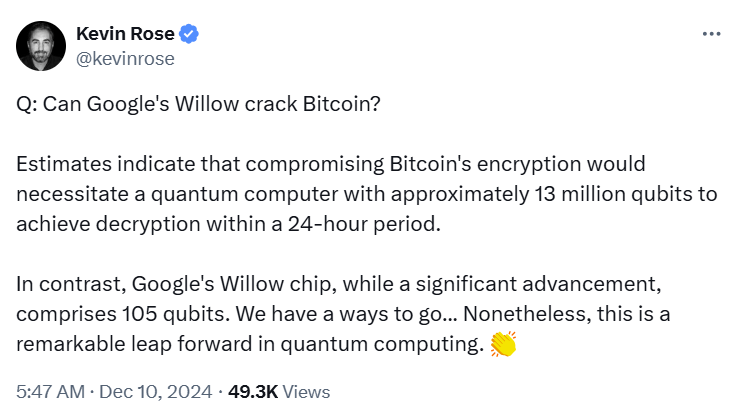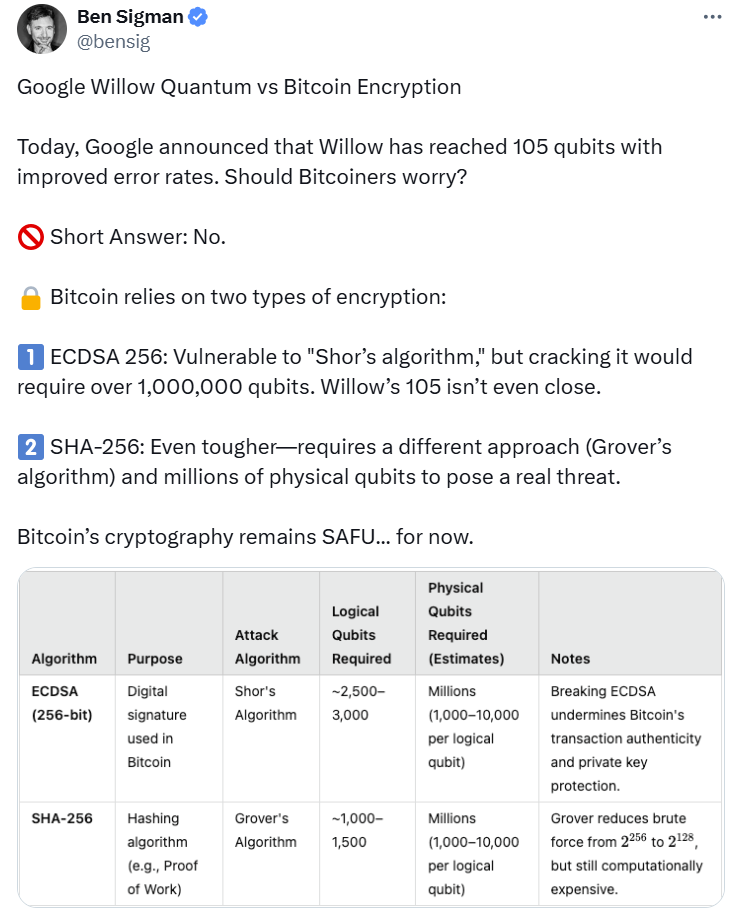Key Takeaways
- The co-founder of Ava Labs highlighted the vulnerability of early Bitcoin holdings to quantum computing attacks.
- Current quantum computing capabilities do not yet pose a threat to Bitcoin’s security.
Share this article
Google’s new quantum computing chip Willow has raised new concerns about Bitcoin security. As quantum computing advances, it could become powerful enough to crack the encryption of coins held by Satoshi Nakamoto, according to Emin Gün Sirer, co-founder of Ava Labs.


Sirer warned that initial Bitcoin holdings stored in pay-to-public-key (P2PK) format could be vulnerable to quantum computing attacks. To mitigate this potential threat, Sirer proposed two solutions: freeze Satoshi’s coins or set a sunset date for P2PK transactions.
But in a previous statement, Sirer said current quantum developments pose no immediate threat.
According to him, cryptocurrency assets such as Bitcoin and Avalanche use technology where public keys are revealed only for a short period of time during a transaction. This means that quantum attackers have limited opportunities to exploit the vulnerability.
“Quantum computing makes it easier to perform certain tasks, such as factoring numbers, but other tasks, such as inverting a one-way hash function, remain difficult. Additionally, depending on the platform, quantum computers have fewer opportunities for attack. “These two facts make the task of quantum attackers significantly more difficult,” he said.
Is quantum leap a looming threat to cryptocurrency?
Quantum technologies have long raised concerns about their potential impact on cryptography. Last August, Bloomberg published a report discussing how quantum computers could potentially break current cryptographic protocols, including blockchain-based protocols.
The report pointed out the potential impact of quantum computing on cryptocurrency mining. He warned that quantum computers could take over the mining process, leading to centralization and security vulnerabilities. It also decrypts your private keys, allowing attackers to steal your cryptocurrency assets.
“Although not an immediate threat, quantum computers could soon pose serious and significant risks to this fast-growing and resilient asset class,” the report wrote. “There may be certain circumstances in which various entities, including asset managers and public companies, may consider publicly disclosing the impact quantum computers may have on cryptocurrency investments or investment strategies related to cryptocurrencies.”
The introduction of Google’s Willow chip has sparked controversy about the speed with which quantum computers could potentially break traditional encryption methods.
The concern is that as quantum technologies mature, they could increasingly weaken the security framework that protects Bitcoin and other cryptocurrency assets.
The cryptocurrency community reacted strongly to Willow’s launch, with many expressing concerns about its impact on Bitcoin’s security.
Some members warn that if quantum computers like Willow are able to advance, they could eventually crack the encryption that protects Bitcoin wallets and transactions, putting trillions of dollars in cryptocurrency assets at risk.
“$3.6 trillion worth of cryptocurrency assets are or will soon be vulnerable to quantum computer hacking,” one community member wrote.
“My fringe theory is that #Bitcoin will eventually be hacked and rendered useless,” said RE PE investment fund manager AJ Manaseer. “This new quantum chip performed in 5 minutes a task that would take today’s supercomputers 10^25 years to accomplish. What impact does that kind of computing power have on encryption? It kills it.”
Although quantum computing is advancing rapidly, many say it is not yet at a level where it poses a serious threat to Bitcoin security.


Experts have argued that breaking ECDSA 256 and SHA-256, two types of Bitcoin encryption, would require a quantum computer with millions of qubits, something Willow lacks.


Share this article

